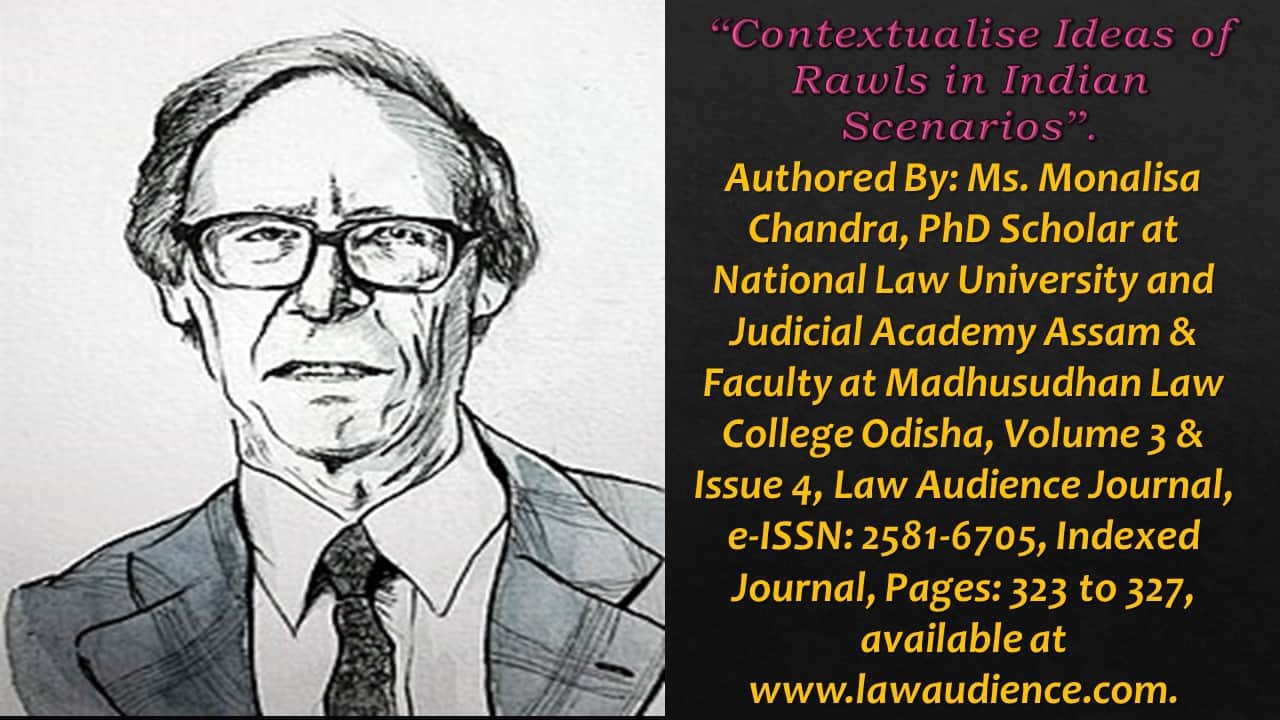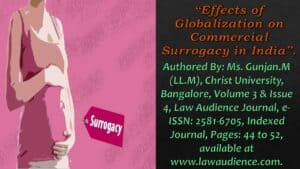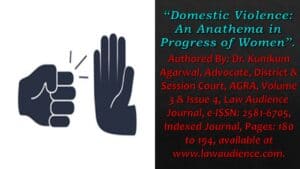Click here to download the full paper (PDF)
Authored By: Ms. Monalisa Chandra, PhD Scholar at National Law University and Judicial Academy Assam & Faculty at Madhusudhan Law College Odisha,
Click here for Copyright Policy.
I. CONTEXTUALISE IDEAS OF RAWLS IN INDIAN SCENARIOS:
As per Rawls what is the term justice related to? It was felt by John Rawl that there must be a real meaning of justice. According to him “Justice” term started with inequality which is unjust. He equates inequality with unjust. One who is the weakest and poorest faces most of equality. And inequality is the fact or real thing. It exists everywhere in every part of the globe. The root cause of inequality is result of liberal capitalist economic system and so the weakest and the poorest are most affected. So, he had an option to remove capitalist system to remove inequality. But he did not accept the above. Because he was not socialist or Marxist n so he was not against capitalist. But the question arises how would he do that? Rawls finds out a way and thinks if this inequality can affect the weakest in a more positive way and can help in improving the conditions of these people. In his theory of justice, it was presented yes, it is possible and if there is an inequality then that inequality is just. He differentiates between just and unjust inequality.
This is the whole basic theory around which Rawls theory revolves. He divides inequality in two parts a) Just inequality which is beneficial b) Unjust inequality which is not beneficial. He says that any social values in society like liberty opportunity income wealth etc are social values. Everybody needs it and all these values must be equally distributed. Rawls view in justice is Distributive justice. Distributive justice means fair distribution of social goods and services. Rawls is a practical philosopher. In reality the equal distribution of the social values is not possible. It’s a hypothetical approach. So, he says yes, these social values should be equally distributed but if not seen equal distribution, then any unequal distribution need to justify inequality. The question arises how?

Rawls finds in-distributive justice i.e., fair distribution does not mean equality. There must be principles of distribution to attain equality fair distribution principles are equal to fair justice. The question arises who will decide the fair distribution of principles.? Rawls suggested that the people together will decide but in special position or real position. This is called original position.
II. ORIGINAL POSITION AND HOW IS IT RELATED AS PER INDIAN SOCIETY?
We have a just and fair principle that everybody in society must follow and accept and will help governing a society. If we want our society be just, we need to have just principles. Rawls says that people everywhere are partial in every section of society and wants to uplift their own benefits. The difference in society will prevail the most influential person will get benefit. So, one solution is , the people/the person who are trying to decide the principles then those people/person who does not know their original status / position in the society. Then these persons are in original position. And this Condition, the person who is in is called Veil of Ignorance. If we apply this above two hypotheses as per Indian Society .Our Indian Society is Divided into many different societies depending upon the Caste, Creed, Sex, Age, Economic Sector, etc. Out of these the Caste and Economy is the most prevalent factor in Indian Society. And it was an initial problem since it created social and economical injustice among the people for decades.
III. TABULAR FORM OF CASTE AND ECONOMIC BASED SOCIETY IN INDIA:
| Types | Benefit the will want(not original position) | Veil of Ignorance and original position. |
| Rich | The rich will want their own benefit | The rich do not know he is Rich. Neutral |
| Poor | The poor will want their own benefit | The poor does not Know he is poor. Neutral |
| High Caste(Brahmins,Khatriyas,Vasyas) | The high Caste will Want their own Benefit | The High caste does not know that he belongs to High Caste. Neutral |
| Low Caste(Sudras) | The Low Caste will want their own benefit | The low Caste does not know he is low Caste. Neutral. |
There are two principles of Justice as per Rawls theory of Justice.
1. First Principle of Justice 2. Second Principle of Justice
(i) Equal Opportunity.
(ii) Difference Principle.
First Principle of justice requires maximum equal and political rights and liberty in a society. That means Liberty to me is equal to Liberty to others. Second Principle is for Social Economic liquidation is just if they attain to position “open to all” and “Benefit to all”.
Let’s assume as per Indian Scenario: There are two types of persons here (i) Raj: The Driver (ii) Mohan: The Scientist.
Here Below we see a huge income gap of Rs 29 lakhs p.a so there is an inequality of income. This inequality can be justified as per “Equal opportunity Principle” .i.e., the opportunity was “open to all” but Raj could not grab it but Mohan Could. We cannot say Raj was incapable or may be this chance was not available for him so he could not but on the other hand Mohan had the chance of becoming a Scientist and he became.
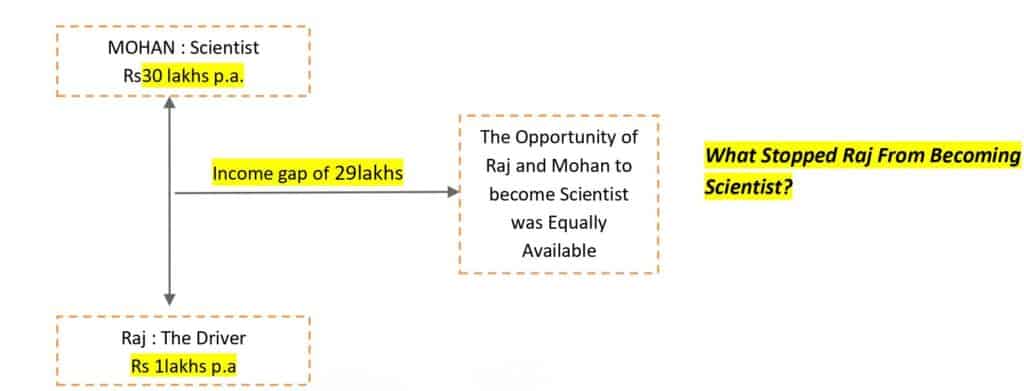
As per Rawls there Are 3 Reasons of inequality in the Society that abstains Raj from becoming a Scientist. Firstly, it could be legal inequality i.e., law prohibits Raj from becoming a Scientist. Secondly, it could be the Birth Status. May be Raj belonged to a poor family so his parents could not afford him proper school, guidance, nutrition. There may be many family members so he could not go to school. On the other hand, Mohan’s Family background must have helped him to become a scientist, they must be supportive and could afford him expensive schoolings thereby focusing on studies and becoming a Scientist.
IV. HOW TO SOLVE THIS BIRTH RELATED ISSUE?
Government must Eliminate all legal or birth status related inequalities. They should not make any law that prohibits a driver to become a scientist. Government Schools with proper education ,food, etc must be given. Free Coaching must be provided to get jobs along with financial aids during education. There must be a Reservation system to provide opportunity to face the exams. In India all these Schemes have been provided by the government which is based on Rawls principle of Equal opportunity (“open to all” and “benefit to all”). Third and the most important reason is Talent & Effort. This is the only reason that justifies the income difference of Raj and Mohan; it is the talent and effort of both of them. If the difference exists because Raj did not study well but Mohan did all his efforts so he became a Scientist, if this inequality is due to talent and effort then we can justify this inequality. Rawls suggests that any inequality that must be because of talent and effort and not birth status and legal inequality.
2(b) Difference principle: When inequalities will “benefit all”. If the income gap of Raj and Mohan will help Raj then it will justify. Government will impose tax on Mohan’s income and this collected tax will be spent on people like Raj for providing free coaching, Schools, and all other benefits. Thus, the Gap will be reduced and Raj’s Condition will be uplifted.
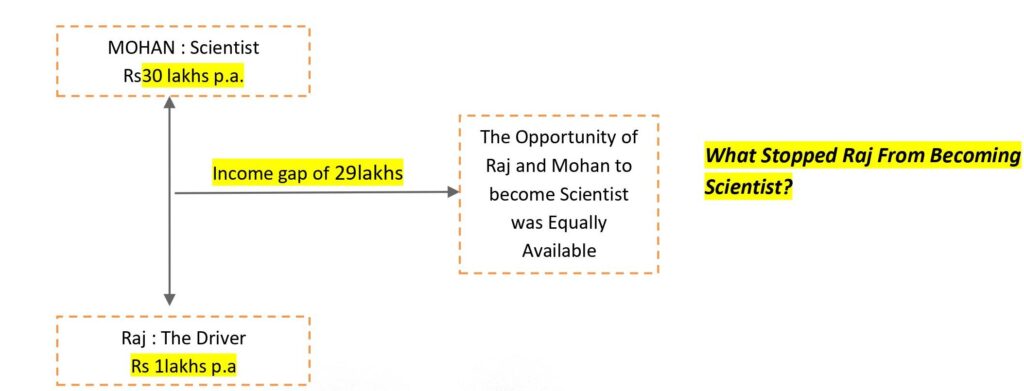
Cite this article as:
Ms. Monalisa Chandra, “Contextualise Ideas of Rawls in Indian Scenarios”, Vol.3 & Issue 4, Law Audience Journal (e-ISSN: 2581-6705), Pages 323 to 327 (24th April 2022), available at https://www.lawaudience.com/contextualise-ideas-of-rawls-in-indian-scenarios/.
